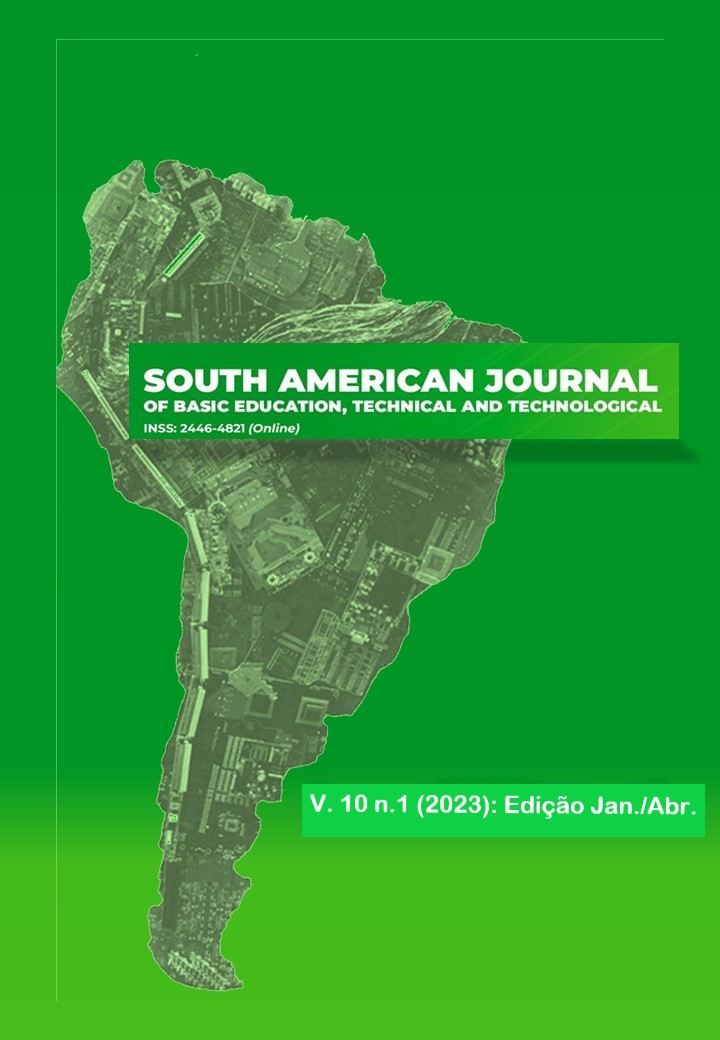SUBSIDIANDO O SABER A PARTIR DA RESOLUÇÃO DE PROBLEMA NO ENSINO DE QUÍMICA
Keywords:
Teaching-learning, PIBID, Problem issuesAbstract
This article aimed to analyze teaching approaches correlating theory with practice from the resolution of problems in the discipline of Chemistry with students of the 3rd year of high school in a public school in the municipality of Humaitá, in the state of Amazonas. The method for collecting the data was through a semi-structured questionnaire for the finalists. 25 students participated in the research. The analysis of the data was qualitative, seeking to recognize elements and meanings relevant to the understanding of the object of study, with the assumption of reflecting on the methodology in the teaching of Chemistry. The results of the research showed that the methodology applied in problem solving, was something positive, being evidenced from the classes taught and the reports with the active participation of the students, very satisfactory, with group discussions to resolve certain situations imposed on the class, making it possible to build differentiated didactic strategies to solve them, thus, building knowledge. It also provided a broader discussion of Chemistry itself, with the students' daily lives, bringing a true view of what the subject is really about, considering that it was no longer seen as an abstract question, providing a correlation of the presence of this, with the environment in which they are inserted, emphasizing that through the project it was possible to retrieve information from content seen in previous years, which will probably make all the difference in their performance in future tests, in addition to responsibility, commitment to the future.
Downloads
References
SANTOS, W.P.L; SCHNETZLER, P. Educação em química: compromisso com a cidadania. 2. ed. Ijuí: Editora Unijuí, 2002.
NUNES, A.S.; ADORNI, D.S. O ensino de química nas escolas da rede pública de ensino fundamental e médio do município de Itapetinga-BA: O olhar dos alunos. In: Encontro Dialógico Transdisciplinar - Enditrans, 2010, Vitória da Conquista, BA. - Educação e conhecimento científico, 2010.
SOUZA, A.K.R. de. Uso da Química Forense como ferramenta de ensino através da aprendizagem significativa. Dissertação (Mestrado em Ensino de Ciências e Matemática) – Centro de Ciências, Universidade Federal do Ceará, 2017.
CAJAS, F. Alfabetização científica e tecnológica: a transposição didática do conhecimento tecnológico. Ensino de Ciências, v.19, n.2, p.243-254, 2001.
SOARES, M. H. F. B. O Lúdico em química: jogos em ensino de química. Tese. (Doutorado). 2004. Universidade Federal de São Carlos: São Carlos, 2004.
RODRIGUES, R.Z. Jogos no Processo de Ensino de Ligações Químicas. Monografia (Graduação em Química). 2013. 37 f. Instituto de Química, Universidade Federal do Rio Grande do Sul, 2013.
AUSUBEL, D.P.; NOVAK, J.D.; HANESIAN, H. Psicologia educacional. Tradução Eva Nick. Rio de Janeiro: Interamericana, 1980.
MORAN, J.M.; MASETTO, M.T.; BEHRENS, M.A. (Ed.). Novas tecnologias e mediações pedagógicas. 13. ed. São Paulo: Papirus, 2007.
FIQUEIRÊDO, M.; BORLOTI, E. Resolução de problemas na atenção ambulatorial da esquizofrenia. Psicologia: Teoria e Prática, 2005. p.207-238.
OLIVEIRA, N.M. Como fazer pesquisa qualitativa. Petrópolis, RJ: Vozes, 2007.
CAVALCANTE, F.S.; FREITAS, J.F.; COUTO, C.A.; TAVARES, G.S.B.; NOGUEIRA, P.G.; LIMA, R.A. DNA Vegetal na sala de aula: o ensino-aprendizagem em Botânica. RECH - Revista Ensino de Ciências e Humanidades – Cidadania, Diversidade e Bem-Estar, v.1, n.1, p.176-191, 2019.
GATTI, B.A.; ANDRÉ, M.E.D.A.; GIMENES, N.A.S.; FERRAGUT, L. Um estudo avaliativo do Programa Institucional de Bolsa de Iniciação à Docência (PIBID). São Paulo: FCC/SEP, 2014.
COSTA, F.J.; MAGALHÃES, A. C. Estado da questão: Arte no ensino de Química. Pesquisa e Ensino, v.1, p.1-15, 2020.
AXT, R. O papel da experimentação no ensino de Ciências. In: MOREIRA & AXT. Tópicos em ensino de ciência. Porto Alegre: Sagra: 1991.
VYGOTSKY, L.S. Pensamento e linguagem. 2.ed. São Paulo: Martins Fontes, 1987.
GOI, M.; SANTOS, M. Resolução de Problemas e Atividades Experimentais no Ensino de Química, p.1-10, 2008.
SANTOS, A.P.B.; MICHEL, R.C. Vamos jogar uma SueQuímica? Química Nova Na Escola, v.31, n.3, p.179-183, 2009.
CUNHA, M.B. Jogos no ensino de química: considerações teóricas para sua utilização em sala de aula. Química Nova na Escola, v.34, p.92-98, 2012.
SANTOS, A.O.; SILVA, R.P.; ANDRADE, D.; LIMA, J.P.M. Dificuldades e motivações de aprendizagem em Química de alunos do ensino médio investigadas em ações do (PIBID/UFS/Química). Scientia plena, v.9, n.7, p.1-6, 2013.
SILVA, R.R.; MACHADO, P.F.L.; TUNES, E. Experimentar sem medo de errar. In: SANTOS, W. L. P.; MALDANER, O. A. Ensino de Química em Foco. Ijuí: Unijuí, 2011. p. 236-261.
CAMARÃO, B.C.; SOARES, J.M.; SALDANHA, L.S.; LIMA, R.A. A percepção de estudantes do EJA do ensino médio sobre a importância da Química no Sul do Amazonas. Ciência & Desenvolvimento, v.13, n.2, p.381-398, 2010.
BRASIL. Lei de Diretrizes e Bases da Educação. Brasília. MEC, 1996.
BRASIL. Secretaria da educação fundamental. Paramentos curriculares nacionais: Ciências Naturais. Secretaria de educação fundamental. Brasília: MEC/SEF, 1998.
BRASIL. Parâmetros Curriculares Nacionais Ensino Médio (PCNEM). Brasília: MEC, 2000.
FELÍCIO, H. M. dos. O Pibid como-terceiro espaço de formação inicial de professores. Revista Diálogo Educacional, v.14, n.42, p.415-434, 2014.
STADLER, J.P.; HUSSEIN, F.R.G.S. O perfil das questões de ciências naturais do novo Enem: interdisciplinaridade ou contextualização. Ciência & Educação, v.23, n.2, p.391-402, 2017.
CRUZ, P.B.; OLIVEIRA, V.O.; MENEZES, J.A.; LIMA, R.A. Construindo o saber a partir de práticas demonstrativas biológicas no processo de ensino-aprendizagem. Revista Sustinere, v.9, n.2, p.396-414, 2021.
BRAGA, M.N.S.; PRESTES, C.F.; OLIVEIRA, V.G.; MENEZES, J.A.; CAVALCANTE, F.S.; LIMA, R.A. A importância das aulas práticas de química no processo de ensino-aprendizagem no PIBID. Diversitas Journal, v.6, n.2, p.2530- 2542, 2021.










